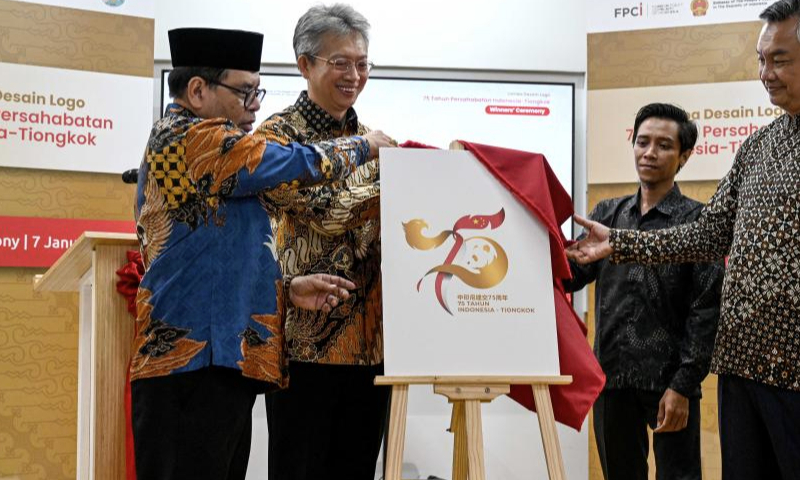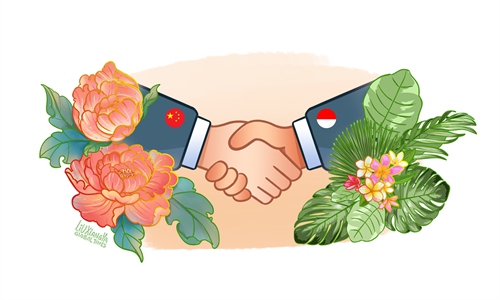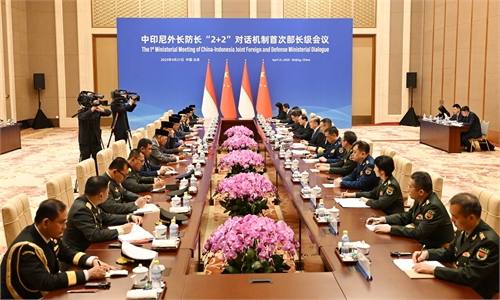China, Indonesia ties continue to mature, with roots deepening in mutual respect, understanding amid global uncertainties: Indonesian envoy

Diplomats from Indonesia and China unveil a logo to commemorate the 75th anniversary of the establishment of diplomatic relations between the two nations in Jakarta, Indonesia, Jan. 7, 2025. The logo was created by an Indonesian youth who won a design competition organized by the Chinese Embassy in Jakarta, the Indonesian Embassy in Beijing, and the Foreign Policy Community of Indonesia (FPCI). Photo:Xinhua
This year marks the 70th anniversary of the Asian-African Conference, also known as the Bandung Conference, and also the 75th anniversary of diplomatic ties between China and Indonesia. In light of these two historical milestones, the Global Times reporters (GT) interviewed Indonesian Ambassador to China H.E. Djauhari Oratmangun, who described the relationship between Indonesia and China as a dynamic journey and said that the two sides have enhanced collaboration across multiple sectors including politics, trade and investment, maritime cooperation, and people-to-people exchanges.
"I envision a relationship that continues to mature, deepening its roots in mutual respect and understanding amid the growing global challenges and uncertainties," said Djauhari.
A dynamic journey
GT: This year marks the 75th anniversary of diplomatic relations between China and Indonesia, as well as the 70th anniversary of the Bandung Conference. In light of these two historical milestones, how would you summarize and evaluate the bilateral relationship?
Ambassador Djauhari: In describing the relationship between Indonesia and China, I view it as a dynamic journey. Just like how a journey is, we have seen our share of up and down. But the essence lies in the direction toward which we strive.
As we commemorate the 70th Anniversary of the Asian-African Conference, it is essential to reaffirm our shared commitments that both Indonesia and China stand firmly against colonialism, advocate for the independence of all nations, and uphold international laws and the sovereign rights of all. These fundamental values are not only prerequisites for inclusive development but also define the future of global order for which Indonesia and China are striving.
This year also marks the 75th anniversary of diplomatic relations between our nations, further underscoring the depth of our ties based on mutual respect, mutual trust, win-win cooperation, fairness, and justice. Since 2013, our relationship has elevated to that of comprehensive and strategic partners, enhancing collaboration across multiple sectors including politics, trade and investment, maritime cooperation, and people-to-people exchanges.
This close partnership has been well reflected by a series of high-level exchanges. In 2024, President Prabowo visited China twice, in April shortly after his election, and in November as his first state visit after assuming office.
Trust and cooperation are both built through understanding, and there is no more effective way to foster this understanding than through direct meetings and transparent communication like the high-level visit. The high-level visit is also about setting the strategic tone. It' s about aligning on major issues, that guides future cooperation and policy direction.
Our economic partnership also continues to flourish. In 2024, trade between Indonesia and China reached a new height of $147.78 billion, a 6.1 percent increase from the previous year, accompanied by a growth in investments to $8.1 billion, up 9.4 percent from 2023.
More important is our people-to-people dimension, the ties that bind our people. Last year, over 1 million Chinese tourists visited Indonesia. Simultaneously, our educational and cultural exchanges have intensified, with an increasing number of students pursuing studies in each nation.
There is still ample room for further growth in our bilateral cooperation, not only in trade and investment, but also other sectors such as green transition, health, digital infrastructure, AI, sustainable infrastructure, and food security.
GT: What role do the "Five Principles of Peaceful Coexistence" and the "Bandung Spirit" play in the transformation of today' s global governance system? How will China and Indonesia collaborate to uphold these principles and address regional and global challenges?
Ambassador Djauhari: In 1955, at the Bandung Conference, the Dasasila Bandung (Ten Principles of Bandung) were adopted, which also incorporated the 5 principles of peaceful co-existence. The Dasasila Bandung, also known as the Bandung Spirit, reflects a commitment to fostering prosperity through respect for self-determination, human dignity, equality, justice, sovereignty, and the promotion of cooperation.
Given the current global landscape, marked by a complex web of national interests, the relevance and timelines of the Bandung Spirit could not be more pronounced. What the world needs now is an enhanced commitment to cooperation that not only honors the Bandung Spirit but also delivers tangible benefits to the people.
In this context, Indonesia and China are uniquely positioned to play a constructive role in promoting South-South cooperation. Indonesia and China can continue to collaborate in projects that are inclusive, mutually beneficial and based on equal partnership. The success of the projects will resonate globally and exemplify the positive impacts of South-South or Global South cooperation.
Full of opportunities
GT: In 2024, China and Indonesia upgraded their "four-pillar" cooperation framework, covering political, economic, cultural, and maritime areas, to a "five-pillar" model by adding security as the fifth pillar. They also signed a series of cooperation documents and commercial agreements, marking a new era of bilateral cooperation. Does this signal intensified collaboration between the two countries in non-traditional security areas such as counter-terrorism, maritime security, and cybersecurity?
Ambassador Djauhari: The security pillar serves as a foundational platform for further cooperation which reflect both our common challenges and national interests. Recently, non-traditional security threats are rising in popularity and intensity, as can be seen with COVID, online gambling, online scamming, etc. Addressing non-traditional security threats is crucial for cultivating stable and prosperous societies, as these threats often cross borders and require a cooperative response.
Fields like counter-terrorism, maritime security, and cybersecurity present significant opportunities for Indonesia and China to collaborate, drawing on each country's experiences and best practices, while adhering to relevant international laws and standards. Potential concrete initiatives could include intelligence sharing, deradicalization programs, joint operations to combat piracy and transnational crime, and partnerships in the cybersecurity awareness, and bilateral consultation on this issue.
GT: China is Indonesia' s largest trading partner and second-largest source of foreign investment, while Indonesia is China' s second-largest investment destination in ASEAN. You have stated that Indonesia has become a key destination for Chinese enterprises going global and for multinational companies restructuring their supply chains. In your opinion, which sectors hold the most potential for cooperation between the two countries? How can both sides further tap into opportunities in emerging fields like digital economy and green energy?
Ambassador Djauhari: ASEAN is indeed an epicentrum for growth, a region where the foundations of peace and stability drive our collective development toward prosperity. Over the last four years, ASEAN and China have stood as each other's largest trading partners. For Indonesia, the landscape of our cooperation is rich with opportunities. Considering our national priorities, and competitive advantage, here are a few potentials that I could think of.
Indonesia, endowed with abundant solar, geothermal, and hydro resources, is a complementary partner for China as one of leaders in renewable technology and investment. This synergy could be harnessed through initiatives such as the ongoing solar panel manufacturing, or through renewable energy-based power generation projects. Such collaborations not only accelerate Indonesia' s energy transition but also contribute to global emission reduction.
Indonesia's potential for EV is also immense. Our cooperation spans throughout the entire value chain. From sustainable nickel mining and processing to the manufacturing of battery cells and the production of EVs. The charging infrastructure further complements this ecosystem. In the digital infrastructure, joint investments for expanding high-speed internet access, developing data centers, and enhancing cloud computing infrastructure, will strengthen Indonesia' s modern economies.
Most importantly, nurturing talent and innovation through joint R&D centers, incubator programs, and specialized training in cutting-edge fields such as AI, big data analytics, and cybersecurity will ensure that our innovations remain pioneering and productive. Additionally, cooperation on smart city solutions, particularly in projects like Indonesia's New Capital (IKN), can provide tangible examples of our joint capabilities in action.
Deepened ties
GT: Earlier this year, Indonesia officially joined the BRICS cooperation mechanism. As ASEAN's leading nation and the world's fourth-most populous country, how will Indonesia's membership in BRICS promote multilateral collaboration between China and Indonesia?
Ambassador Djauhari: Indonesia's accession to BRICS is a strategic step in strengthening our role in global affairs. BRICS is more than just an economic grouping; it is a platform where emerging economies like Indonesia can contribute to shaping a more balanced and inclusive international order. By engaging with this framework, we seek to bridge the gap between developed and developing nations, ensuring that multilateral institutions reflect today's global realities.
Developing nations have long faced structural challenges in the global economy. Through this platform, we aim to enhance trade, investment, and technology partnerships that drive sustainable growth and reduce external vulnerabilities. I see this as an opportunity to build a more resilient and self-reliant economic network that benefits our people.
Additionally, as a middle power, we are committed to promoting an international system that is more representative, fair, and responsive to the needs of emerging economies. Constructive engagement in global governance requires diplomacy, dialogue, and a commitment to common interests, and Indonesia stands ready to contribute.
GT: You have served as Indonesia's Ambassador to China since 2018, making you one of the longest-serving ambassadors in the country. From your perspective, what achievements have China and Indonesia made in jointly advancing the Belt and Road Initiative (BRI)? As major members of the Global South, how can Indonesia and China play a greater role in South-South cooperation?
Ambassador Djauhari: Indonesia and China have signed an important agreement that links Indonesia's Global Maritime Fulcrum initiative with China's Belt and Road Initiative. This partnership aims to boost economic growth in four key regions in Indonesia by developing them into specialized economic hubs.
To further boost our cooperation in developing respective industries and strengthen supply chain, Indonesia and China have also established the "Two Countries, Twin Parks (TCTP)." Indonesia is also uniquely positioned as a strategic hub to exemplary investment projects between Indonesia and China. When something works in Indonesia, it sets an example, and it builds momentum. Success here has a high chance of being emulated across the region.
The Jakarta-Bandung High-Speed Railway stands as a tangible symbol of Indonesia-China strategic cooperation. This project is not just about connectivity, it drives economic growth along this corridor, creating new opportunities for businesses and communities.
GT: Standing at the 75th anniversary of diplomatic relations, what are your expectations for the future development of China-Indonesia relations? How can the two countries work together to elevate the construction of their Community of Shared Future to new heights?
Ambassador Djauhari: 75 years, that's a long road for any two nations to walk together. Looking ahead, I envision a relationship that continues to mature, deepening its roots in mutual respect and understanding amid the growing global challenges and uncertainties.
The question is, how to realize it? It won't happen through grand declarations alone. We need to deepen our understanding, forge practical synergy, shoulder shared responsibility, and always be mindful of the well-being of our people and the principles that guide responsible nations. It's a journey best made with open communication and a steady hand.
Several practical initiatives have been implemented to foster closer bilateral relations, including the frequent business missions, exchange of journalists, facilitated visits between non-governmental organizations, and the provision of scholarships from both countries. Additionally, the embassy is actively working to establish a community of influencers from both nations. This initiative seeks to leverage the growing influence of social media to enhance cultural and social engagement between our countries.
Having said that, from Indonesia's perspective, we would like to enhance mutually beneficial cooperation, which translates into tangible results in improving the well-being of our people and achieving the long-term vision of Indonesia Emas 2045 (Golden Indonesia 2045).




